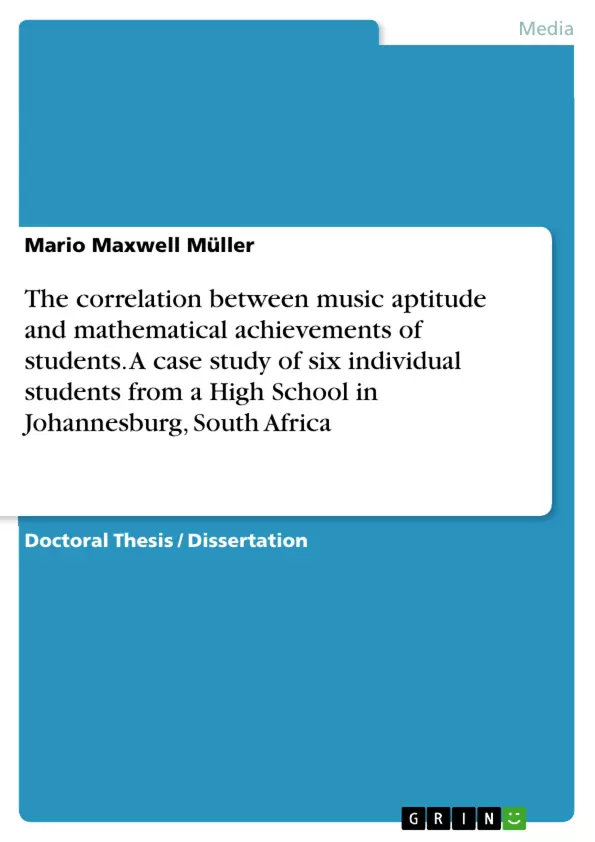A gap existed in the literature focusing on research overall between music aptitude and mathematical achievement within a South African context. The purpose of the study was to investigate the effect of music aptitude on mathematical achievement and to evaluate the most appropriate instruments for measuring musical talents and juxtaposing them with mathematical achievement using Gordon's AMMA tool to establish the connection between musical acumen and mathematical achievement in randomly selected learners. This study presented data that is now available for use by other researchers. The researcher used exploratory designs to generalise, assess, and test qualitative exploratory results, and to see if they could be generalised to a sample and a population as outlined in this dissertation. This research was evaluated in both qualitative and quantitative phases. The researcher focussed on how students of different ages, gender, intelligence levels, and musical abilities reacted to the AMMA (music aptitude test).
The researcher was intrigued to see that most of the music students in the secondary school could compose with ease without prior knowledge of composition thus demonstrating an excellent theoretical background, which was prevalent in his discussions with colleagues. Having studied the previous school curriculum, they were exposed to since their childhood in primary school, the researcher could not find any relevant material linked to composition, form, structure or even analysis. Conversations with colleagues in the mathematical department revealed that the same students were doing extremely well academically in their mathematical subjects. This raised further questions for the researcher; was this merely a coincidence or was this increase in academic achievement due to the impact of their music studies?
Most parents in the community encouraged their children to attend private schools and went out of their way financially to provide for a good education reinforcing good will and intentions to foster a brighter future for these learners. For students to achieve excellent results, aptitude played a prominent role in their musical development.
Inhaltsverzeichnis (Table of Contents)
- ABSTRACT
- DEDICATIONS
- ACKNOWLEDGEMENTS
- CHAPTER 1: INTRODUCTION
- 1.1 Background of the study
- 1.2 Statement of the problem
- 1.3 Purpose of the study
- 1.4 Research questions
- 1.5 Significance of the study
- 1.6 Scope and limitations
- 1.7 Definitions of key concepts
- 1.8 Organization of the study
- CHAPTER 2: LITERATURE REVIEW
- 2.1 The relationship between music and mathematics
- 2.2 Music aptitude and mathematical achievement
- 2.3 The role of music education in fostering mathematical skills
- 2.4 The use of music in teaching mathematics
- CHAPTER 3: RESEARCH METHODOLOGY
- 3.1 Research design
- 3.2 Participants and sampling
- 3.3 Data collection instruments
- 3.4 Data analysis procedures
- 3.5 Ethical considerations
- CHAPTER 4: RESULTS AND DISCUSSION
- 4.1 Descriptive statistics
- 4.2 Inferential statistics
- 4.3 Discussion of findings
- CHAPTER 5: CONCLUSIONS AND RECOMMENDATIONS
- 5.1 Summary of findings
- 5.2 Implications for practice
- 5.3 Recommendations for future research
Zielsetzung und Themenschwerpunkte (Objectives and Key Themes)
This research investigates the relationship between music aptitude and mathematical achievement within a South African context. The study aims to determine the effect of music aptitude on mathematical performance and identify suitable instruments for measuring musical abilities and their correlation with mathematical achievement.- The impact of music aptitude on mathematical achievement.
- Identifying appropriate instruments for measuring musical talents.
- Investigating the correlation between musical abilities and mathematical achievement.
- Exploring the role of music education in fostering mathematical skills.
- Examining the potential benefits of incorporating music into mathematics instruction.
Zusammenfassung der Kapitel (Chapter Summaries)
- Chapter 1: Introduces the research topic, outlining the background, research question, and significance of the study. It also defines key concepts and describes the study's organization.
- Chapter 2: Reviews relevant literature exploring the relationship between music and mathematics, the influence of music aptitude on mathematical achievement, and the potential of music education in fostering mathematical skills. The chapter also examines the use of music in teaching mathematics.
- Chapter 3: Describes the research methodology, including the research design, participants, data collection instruments, and data analysis procedures. It also outlines the ethical considerations taken into account during the study.
- Chapter 4: Presents the results of the study, including descriptive and inferential statistics. This chapter analyzes the data collected and discusses the findings in detail.
Schlüsselwörter (Keywords)
The main focus of this research lies on the connection between music aptitude and mathematical achievement. This involves exploring the correlation, analyzing data using the Advanced Measures of Music Audiation (AMMA) test, and examining the impact of musical abilities on mathematical performance. The study aims to understand the relationship between music, including aspects like rhythm and tonality, and its influence on mathematical skills.Frequently Asked Questions
Is there a correlation between music aptitude and mathematical achievement?
This study investigates the connection, suggesting that students with high musical acumen often perform better in mathematical subjects due to similar cognitive structures.
What is the Gordon's AMMA tool?
The Advanced Measures of Music Audiation (AMMA) is a standardized test used to measure music aptitude, specifically looking at tonal and rhythmic memory.
How can music education benefit mathematical skills?
Music education can foster skills like pattern recognition, logical thinking, and structural analysis, all of which are fundamental to success in mathematics.
What was the scope of this case study?
The study focused on six individual students from a High School in Johannesburg, South Africa, evaluating their musical and mathematical performance.
Why is this research significant in a South African context?
It addresses a literature gap regarding the impact of music education on academic achievement within the specific socio-educational landscape of South Africa.
- Quote paper
- Mario Maxwell Müller (Author), 2023, The correlation between music aptitude and mathematical achievements of students. A case study of six individual students from a High School in Johannesburg, South Africa, Munich, GRIN Verlag, https://www.grin.com/document/1390262



